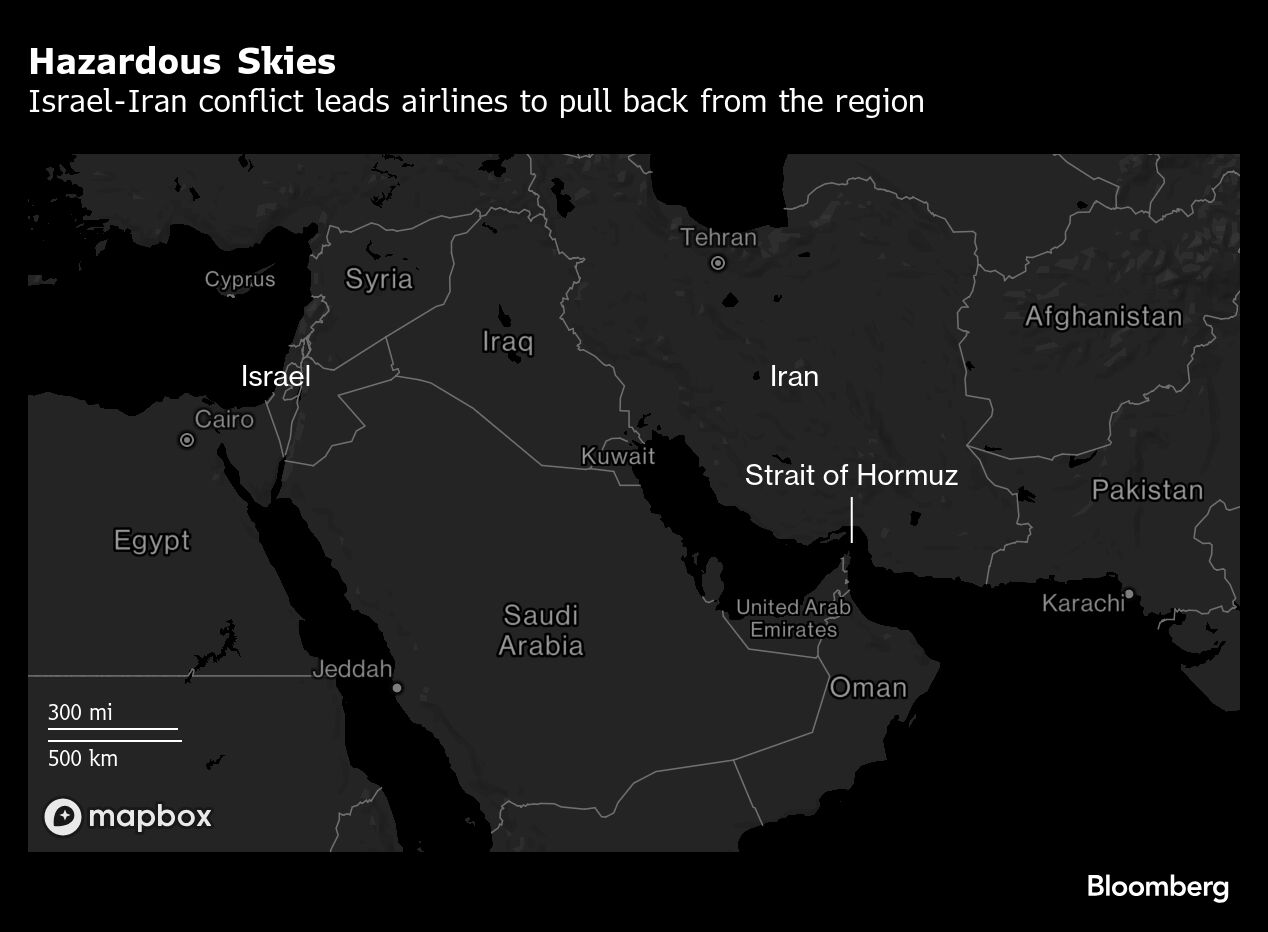
Qatar suspended its air traffic as a precautionary measure in response to the regional armed conflict, effectively halting operations of its namesake airline after the US struck nuclear sites in Iran and Tehran vowed to retaliate.
The move is the most consequential yet for air traffic in the region. Qatar Airways runs a global operation out of its Doha hub, connecting more than 140 destinations around the world. The move follows other airlines, including Singapore Airlines Ltd., British Airways and KLM, suspending their service to destinations including Dubai, home to one of the world's busiest airports.
“This is part of a set of precautionary measures taken based on developments in the region,” according to a statement from Qatar's Ministry of Foreign Affairs.
The decisions highlight the potential for a widening of the war between Israel and Iran after US President Donald Trump joined the fight by attacking Iran's nuclear sites. The dramatic escalation risks retaliation, potentially disrupting economies that had previously been shielded from the fallout of regional hostilities.
Dubai, home to Emirates, and Doha, the capital of Qatar, are major travel hubs that handle much of the traffic within the Middle East and form a crossroads for long-haul travel between Asia, Europe and North America. They had avoided previous suspensions that were contained to countries surrounding Israel and the skies over nations where Iran's missiles pass.
Prior to the US strikes on Sunday, Tehran threatened to hit US bases in the Persian Gulf should Washington get involved, and close down the Strait of Hormuz, a vital oil-trade waterway bordering with the United Arab Emirates and Oman. Qatar hosts the largest US base in the region, while Bahrain is home to the US Navy's Fifth Fleet.

A widening conflict around the Strait of Hormuz could threaten to disrupt global airline traffic, particularly if flight restrictions to key transfer hubs in Qatar and the UAE were to occur,” Bloomberg Intelligence analysts Eric Zhu and George Ferguson wrote in a note. Excluding local carriers, Indian airlines including IndiGo, Turkish Airlines and British Airways are among the most exposed, they wrote.
Shares of the major network carriers fell, including Air France-KLM, Deutsche Lufthansa AG and BA parent IAG SA in Europe. United Airlines Holdings Inc. and Delta Air Lines Inc. declined in US trading.
Singapore Airlines has halted flights to Dubai from the city-state since Sunday over security concerns.
British Airways diverted a Dubai-bound flight to Zurich after it reached Saudi Arabia's airspace in the early hours of Sunday, according to data from Flightradar24. Another jet returned to Heathrow after going as far as Egypt.
The London-based carrier earlier halted routes to Bahrain through the end of the month due to operational constraints and airspace restrictions.
With no clear view on next steps, some companies began to take precautions. Japan's biggest banks are considering evacuating employees, with Mitsubishi UFJ Financial Group Inc. beginning to pull out the families of staff. Japan's biggest bank has also halted unnecessary travel in and out of the region.
Asian airlines have also taken steps to safeguard passengers and crews. Japan Airlines Co. said earlier it would have flights between Tokyo's Haneda airport and Doha avoid airspace above the Persian Gulf and Gulf of Oman. Air India Ltd. will progressively avoid the use of certain airspace over the Persian Gulf in the coming days.
The actions follow Trump's decision to undertake the US' first direct military action against Iran after decades of hostility, pushing the Middle East into uncharted territory. The possibility of further disruption will depend on how forcefully Iran retaliates. Trump has threatened more attacks if Tehran doesn't capitulate.
Even before the US strikes, several American and European airlines had paused flights to the United Arab Emirates and Qatar after Israel started bombarding Iran.
The skies over large swaths of the Middle East have been restricted several times during the past 20 months, making flying through Israel, Jordan, Lebanon, Syria, Iraq and Iran difficult.
The closures have forced airlines to cancel flights on profitable routes, spend more on jet fuel and pass through countries they usually avoid like Afghanistan, as they avoid dangerous skies. It has also meant hundreds of disrupted flights and thousands of stranded passengers.
Following US attacks on Iranian nuclear facilities, commercial traffic in the region is operating as it has since new airspace restrictions were put into place last week.
Image from 01:45 UTC 22 June. pic.twitter.com/IeJBa9kvF4Israel has started to allow outbound flights after halting them since its latest attacks on Iran starting June 13. Tel Aviv is expected to let about 1,000 passengers per day leave the country from Ben Gurion Airport and Haifa.
The flights, which have a strict limit of 50 passengers per plane to prevent too many people from congregating and presenting a major target at the airport. The government will prioritize foreigners, diplomats and nationals needing to evacuate for life-saving or humanitarian reasons.
The UK is organizing a chartered flight for British nationals who want to leave Israel, while Germany sent a military transport plane to extract citizens and France said it also plans repatriation flights.
“Everything depends on how long this lasts,” Ziad Daoud, chief emerging markets economist at Bloomberg Economics, said of the fallout from the flight cancellations. “If there was a stoppage of flights for a day or two, there won't be an impact, but if this is a prolonged thing then obviously it's an issue.”
Dubai airport deferred all queries to the emirate's media office who said the hub remains fully operational for the time being, with the vast majority of flights running on schedule.
Essential Business Intelligence, Continuous LIVE TV, Sharp Market Insights, Practical Personal Finance Advice and Latest Stories — On NDTV Profit.























